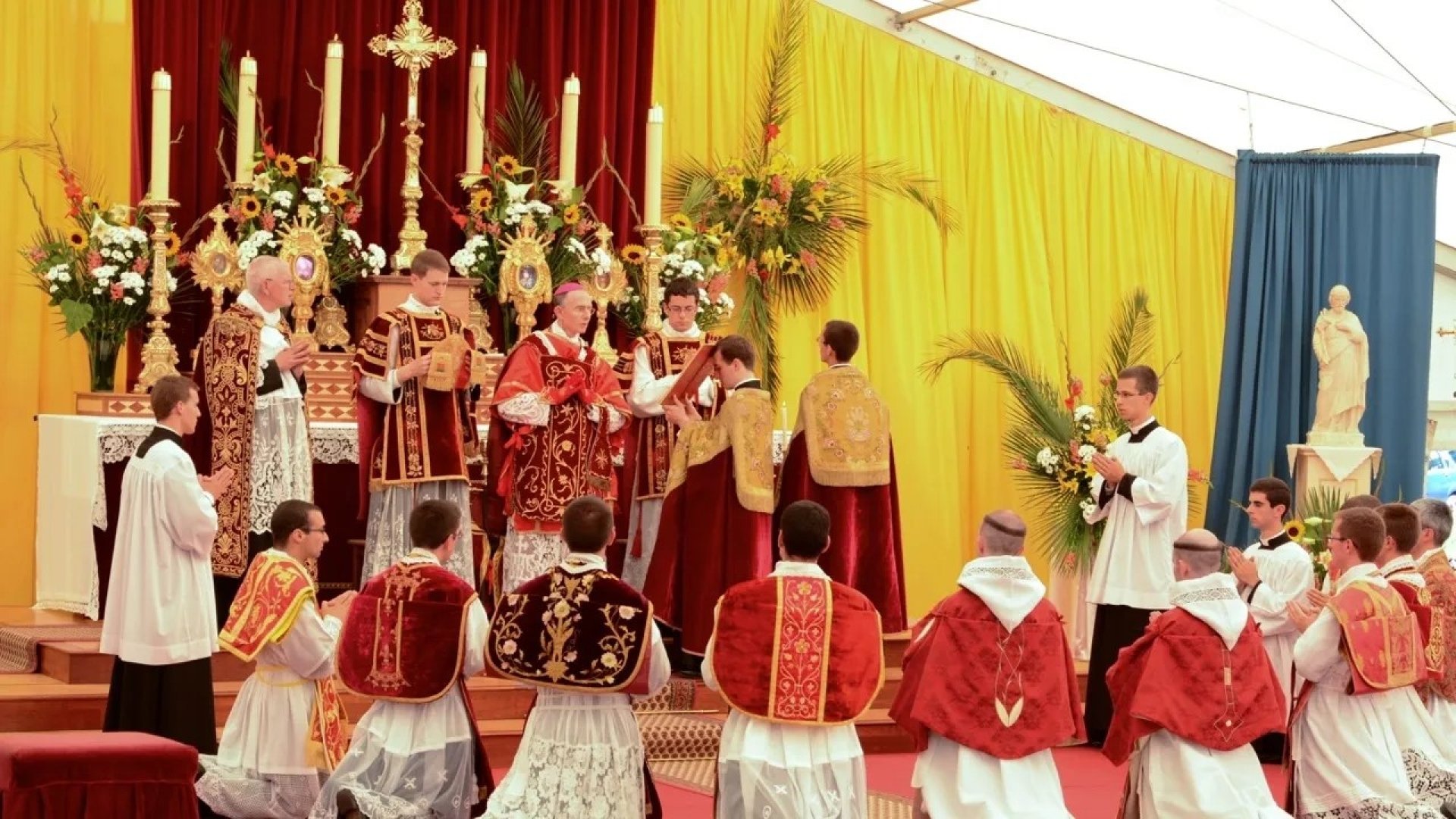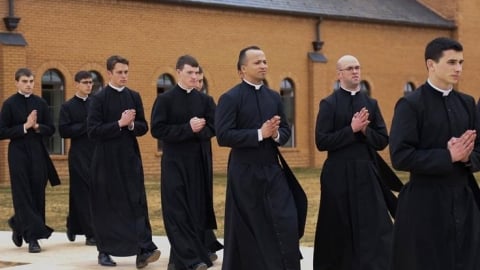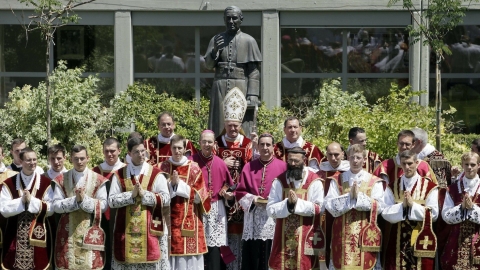Sacerdotal Vocation

"Go therefore, and teach ye all nations." These were the words uttered by Christ when He gave His disciples the divine commission to preach the Gospel to every creature. The disciples of Jesus Christ were the predecessors of the priests of the Catholic Church, and to our priests, the same mission is transmitted. The office of a priest is to save souls. Thousands of souls pass each day into eternity, many of them having lived in total ignorance of the true church. In Asia, there are millions of people who lie in the darkness of paganism and to whom the sweet gospel of a loving God has never been preached.
Today Christ looks down on these poor beleaguered races and has compassion on them as He had on the multitude of Judea, "for they are like sheep that have no shepherd." He reminds the Catholic youth that "the harvest indeed is great but the laborers few." Priests are needed everywhere to represent Christ and to continue His mission. Many will at this time decide upon their future careers, and what more noble, what more exalted career could one pursue than the same career pursued by Christ, calling all into one fold, calling all beneath the guidance of one shepherd? Who has the vocation? Who is worthy? If by worthy is meant deserving of this honor through one's own merits, no one is.
How could man, having been stained by sin, ever be deserving of the dignity of an Alter Christus? No one is worthy of this office through any merit of his own. Yet in the rite of Ordination, the Bishop, when requested to ordain young men, asks, "Dost thou know them to be worthy?" The answers tell us in a word what worthiness is exacted. "As far as human weakness permits, I know and testify that they are worthy of this office." Humanly speaking, then, who is worthy? St. Thomas speaking of the qualities of those to be ordained enumerates two: Goodness of life and knowledge of Holy Writ. With regard to the first, St. Thomas, quoting St. Dionysius, says, "Even as the more clear orbs, being filled with the solar radiance, enlighten other bodies with their brilliant light, in the same way that they themselves are illumined by the sun; so in all things pertaining to God, a man must not dare to become a leader of others unless in all his habits he be most deiform and Godlike." Is not the priest to lead others to God? Then he must be of irreproachable character. With regard to the second requirement, St. Thomas says, "For a man to exercise the office of an Order, it is necessary that he have as much knowledge as suffices for his direction in the act of that Order." The three principal marks or signs mentioned by St. Alphonsus - purity of intention, science and talents, and positive goodness of character - may all be reduced to the two requirements of St. Thomas. By purity of intention, he means having the desire to be employed in the service of God, in one's own salvation, and in the salvation of others.
Purity of intention means to do all in one's power to save souls. No one should present himself impelled by ambition, self-interest, or for worldly motives. One with a pure intention will apply for admission to Holy Orders having Christ as an exemplar; he will intend to spend all in the care of souls. If one has not this in mind, he is lacking in the very fundamentals of a good character, which is recorded by St. Thomas as the first requirement for a candidate for Holy Orders. Science and talents, which form the second requirement as enumerated by St. Alphonsus, resolve into the ability and willingness to learn; to acquire sufficient knowledge to guide one in the duties of his state. It is not necessary that a person be an intellectual giant, but he must be of average intelligence. Positive goodness of character is also insisted on by St. Thomas. One desiring to enter Holy Orders must not be in the habit of any vice. Absolute perfection is impossible for man to attain surrounded as he is by temptations of the world, the flesh, and the devil, but he must conscientiously strive after perfection. Probity and science are the two requisites enumerated by these Doctors of the Church, and on reading the admonitions of St. Paul to Timothy and Titus, we see that the Apostle and the above-mentioned doctors are in perfect accord concerning the men to be chosen for Holy Orders. St. Paul says they must be "chaste, not double-tongued, not given to much wine, not greedy of filthy lucre, holding the mystery of faith in a pure conscience."
The Council of Trent gives as a first requisite to legitimately receive Holy Orders, integrity of life and morals, because it is the duty of a priest to enlighten others by lustre of his virtue and innocence. And in the acts of the same council we read that, the priest must be able to instruct the people in the mysteries of the Christian faith and the precepts of the divine law, to excite the faithful to piety and virtue, and to reclaim them from sin. However, in addition to these two requisites, goodness and learning, which may be termed moral and mental strength, there is also required physical strength. The following statement, found in the Catechism of the Council of Trent, makes evident the necessity of physical well-being. "Persons laboring under any physical deformity, or in any way maimed, ought not to be admitted, for such deformity and debility offend the eye and must of necessity prove an obstacle in the administration of the sacraments."
Pope Pius X also called attention to the need of these three, physical, mental and moral strength, when he said that, "nothing more is required of a candidate to justify his being called to Orders by his Bishop than a correct intention and a fitness for the priestly state, a fitness resulting from such gifts of nature and grace, and attested by such probity of life and such attainments of professional knowledge, as would afford a well grounded hope of his ability to discharge in a proper manner, the duties of the priesthood, and worthily fulfill its obligations."
Good character then, and sufficient learning, coupled with sufficient strength to undertake the arduous duties of the state, may be considered as rendering one fit for ecclesiastical office. This is the general rule. Individual cases, surrounded by their own peculiar circumstances, will arise, and since we are attempting to give, in a short space, the teaching of the Church on vocations, we cannot treat them here. Prayer is of prime importance that, "that Light that enlighteneth every man who cometh into the world" may light and guide each one along the way of truth. Every Catholic youth should consult with his confessor, for in him will he find a true friend, one who understands, one who can help him to do, to choose what is best.
In the present discipline of the Church, the proper theological training necessary to fit one for the sacerdotal duties may be acquired only in the seminary, religious novitiate or House of Studies, and these and other similiarly authorized institutions have no small part in the selection of vocations. Their standards of judgment may differ in unessential qualifications, but they are guided by generally constant principles which test the worthiness of the candidate by divine and human measurements.
A vocation to the priesthood is a divine gift. It must come from God. St. Paul inspired by the Holy Ghost said, "Neither doth any man take the honor to himself, but he that is called by God, as Aaron was." Christ has said, "You have not chosen Me, but I have chosen you." These passages of Holy Writ plainly manifest the divinity of the sacerdotal vocation. It has its source not from men, but from God, who alone has the right to raise man to the dignity of a "priest according to the order of Melchisedech."
The divine element in the vocation to the priesthood is better understood when two kinds of vocations oftentimes mentioned are recalled. The one is internal. It is that inward desire that some have to enter Holy Orders: it is an inclination, an attraction which lies deep in one's soul, for the ecclesiastical career. It has also been called a prompting of the Holy Spirit. This has been considered by some as being the essential element in a vocation. It is not. Pope Pius X explicitly says, "A vocation by no means consists, at least necessarily or ordinarily, in an inward desire or prompting of the Holy Spirit."
Since what has been called an internal vocation is not ordinarily necessary, how does God manifest His call to men to join the ranks of His co-laborers? In the manner described by the Council of Trent, commenting on the passage from St. Paul, "Neither doth any man take this honor to himself, but he that was called by God, as Aaron was. They are said to be called by God who are called by the lawful ministers of the Church." They, then, who are called to Holy Orders by the Bishop, are said to have a vocation, a call from God to enter this exalted state. They are chosen by God. This is called external vocation. This call is issued to students of seminaries, where the full course of ecclesiastical sciences is pursued, where young men are tried in accordance with the admonition of St. Paul, "Let these also first be proved." They are tried if they be really fit mentally, physically and morally, and there at the same time they are being made more worthy.
Since this external vocation is the prime requisite for a vocation, and since this call is issued to students of seminaries, the whole question resolves itself into a consideration of what are the requirements for entrance to a seminary, and the two enumerated above, goodness of life and sufficient learning, containing as they do, the need of a pure intention, are all that are strictly necessary.
If one then has not the internal vocation, but realizes the vanity of the things of earth; realizes that the world is full of deceit, danger and sin, and honestly desires to escape these dangers; realizes that the most important task of man is the salvation of his soul; realizes that the most noble work of man is to imitate Jesus Christ, he may apply to the seminary, knowing he is pleasing God. If he has sufficient mental and physical capacity to labor in the priesthood, and is determined to do all in his power, aided by God's grace, he may be sure that he is justified in presenting himself as a candidate for Holy Orders. From all this it is evident, that no one has a true vocation, even though he be fit, until he is called by God's lawful minister, the bishop, and all that is necessary to justify, to legitimate such a call, is that the candidate be worthy.
It would be well to state, that much the same teaching holds in regard to religious vocation. Such a great degree of sanctity is not required that one become a religious as for the priesthood, because the purpose of the religious life is to strive after perfection by means of the evangelical counsels, by means of the three vows. For a religious vocation one must have all the requirements laid down by the particular institute which he wishes to enter, and the vocation is granted him when he is received to profession. A right intention is above all things necessary. With regard to a vocation to the priesthood in a religious order, the candidate by entering religion, binds himself by the three vows, and by means of these is enabled to attain a greater degree of perfection before ordination, he is enabled to become more worthy of the office, if he applies himself conscientiously to the observances of his rule and his vows.
Who are the missionaries? What is required to be one? A spirit of willingness to follow Christ and to become more like Christ. Over and above the requirements for the priesthood, or the religious vocation, for the life of a missionary, one must have a willingness to give up home, country, friends and comforts for the sake of God's glory, for the purpose of bringing the faith to those who sit in darkness. He must have at least the willingness to do this. To be a missionary one must have a fair share of common sense, the ability to adjust himself to new surroundings, and to do without things and persons to whom he is accustomed. One must be in good general health, strong enough to do without special food and care, willing, and able physically, to do without some of the comforts of civilization.
To many this life will appeal, this life with its widened horizon, where results seem quicker and more tangible, where missionaries become the intimate friends of Christ, where they become the companions of the greatest adventurer of all times. God is calling, let them who can take the word, take it and enroll under the banner of the cross to capture lands and save souls for Christ.
In short, then, such is the teaching of the Church on sacerdotal vocations. Any young man with right intentions, of good morals, of sufficient mental acumen and physical ability, may offer himself to the diocese or novitiate for preparation for Holy Orders, and when, in time, the superiors consider him fit, he may be legitimately summoned to be ordained, to be the fellow worker of Christ.





